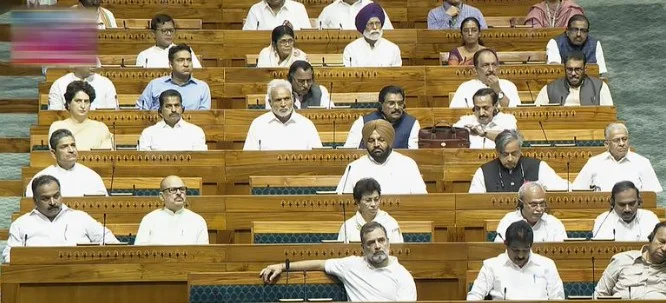NEW DELHI, July 27 — After a week of stalled proceedings, Parliament is bracing for a stormy debate starting Monday as the ruling BJP-led National Democratic Alliance (NDA) and the Opposition prepare to clash over the Pahalgam terror attack and Operation Sindoor — two flashpoints steeped in national security and foreign policy tensions.
A marathon 16-hour debate in both the Lok Sabha and Rajya Sabha — beginning Monday and Tuesday respectively — will see top ministers and leaders from across the aisle take the floor. Home Minister Amit Shah, Defence Minister Rajnath Singh, and External Affairs Minister S. Jaishankar are expected to outline the government’s strategy and outcomes, while Prime Minister Narendra Modi may also intervene to defend what the Centre has described as a “robust” and decisive response to terrorism.
From the Opposition benches, Congress leaders Rahul Gandhi and Mallikarjun Kharge, along with Akhilesh Yadav of the Samajwadi Party, are set to lead the charge. Their criticism has focused on alleged intelligence failures that allowed the April 22 Pahalgam attack, which claimed 26 civilian lives, and what they describe as India’s diplomatic isolation during Operation Sindoor, a retaliatory military action targeting terror infrastructure in Pakistan-occupied Kashmir.
“India failed to secure international support during Operation Sindoor,” Rahul Gandhi has said repeatedly, citing former US President Donald Trump’s mediation claims to argue that the government has weakened India’s foreign policy standing.
The ruling NDA, however, has doubled down on its position. Modi has hailed Operation Sindoor as a demonstration of India’s military resolve and indigenous defence capabilities. “We have established a new normal — no distinction between terrorists and their sponsors,” he said in a recent address.
The government claims that the precision strikes inflicted substantial damage on multiple Pakistani airbases. Though the four-day conflict saw retaliation from Islamabad, India maintains its objectives were fully met.
The NDA is expected to bolster its case by fielding MPs who were part of seven multi-party delegations that visited over 30 global capitals post-operation to counter Pakistan’s narrative. Among them are Shrikant Shinde (Shiv Sena), Sanjay Jha (JD-U), and Harish Balayogi (TDP), who are expected to recount diplomatic engagements that, the government says, reaffirmed international support for India’s actions.
One unresolved point is whether Congress MP Shashi Tharoor, who led the Indian delegation to the US, will be allowed to speak. His praise for the government’s handling of the operation has reportedly irked sections of his own party. Sources suggest the Congress may still find a way for Tharoor to participate, given his role.
Meanwhile, tensions continue to simmer over a separate Opposition demand for a debate on the Special Intensive Revision (SIR) of electoral rolls in Bihar. The Opposition has alleged the Election Commission’s revision exercise is aimed at bolstering the BJP’s position in the poll-bound state — a charge the EC has denied, saying the goal is to ensure only eligible voters are on the rolls.
The first week of the Monsoon Session was largely washed out over this issue, with the Opposition stalling both Houses. Parliamentary Affairs Minister Kiren Rijiju has said the government is open to discussion under rules, but “every issue cannot be taken up at once.”
With national security, electoral integrity, and political credibility all at stake, this week’s proceedings promise to be a defining moment in the run-up to the next general election — both in terms of parliamentary debate and public perception.

